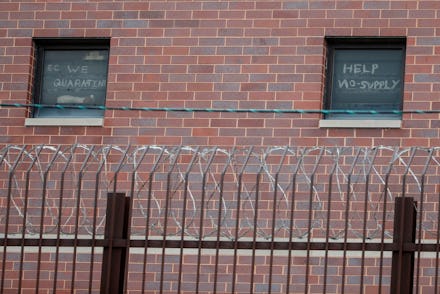Nearly 75% of federal inmates who have been tested have had coronavirus

As of this week, more than 1 million people in the United States have confirmed infections of the novel COVID-19 coronavirus strain that has has fundamentally warped our daily lives. It's a staggering number that will likely only continue to grow as an increasing number of states begin the medically inadvisable process of easing the restrictions set in place to help mitigate the pandemic's spread. But in places where those mitigating efforts were not — or could not — be enacted, the rate of infection appears to have skyrocketed to almost unthinkable heights. Specifically: in prison.
According to new data released by the Bureau of Prisons to the Associated Press, the overwhelming majority of inmates in the federal penal system who have been tested for the coronavirus have tested positive. How overwhelming? Nearly 75%.
It's important to stress that that figure represents a small fraction of the total 141,933 of people in the federal prisons. Rather, it comes from the 2,700 coronavirus tests that have been conducted so far throughout the prison system. Of those 2,700 tests, almost 2,000 were positive. Still, despite the small sample size, the results "strongly [suggest]" an overwhelming infection rate within the penal system at large, per AP.
"A lot is yet unknown about how to limit [coronavirus's] transmission in a correctional environment," BOP medical director Dr. Jeffrey Allen told AP. "That’s why we’re collaborating with the CDC to try to identify that sort of data that can inform our management strategies going forward."
Criminal justice reform advocates have long warned that America's prison system was uniquely vulnerable to the coronavirus pandemic, prompting calls for — and some instances of — early releases for a number of at-risk inmates. According to research from the American Civil Liberties Union, failing to address the virus's spread throughout the prison system could lead to approximately 100,000 additional fatalities in the United States alone.
Some politicians have thus far resisted calls for early release of certain inmates. "These are all folks who are there for a reason," Nebraska's Republican Gov. Pete Ricketts argued in early April. "They need to serve out their sentence."
For some inmates — even those convicted of non-violent, minor offenses — that sentence could end up being death.